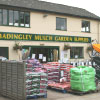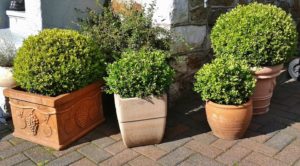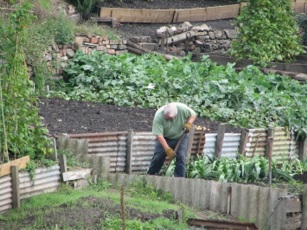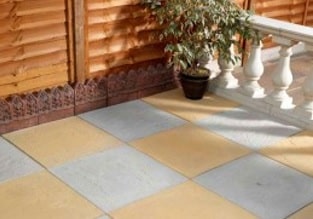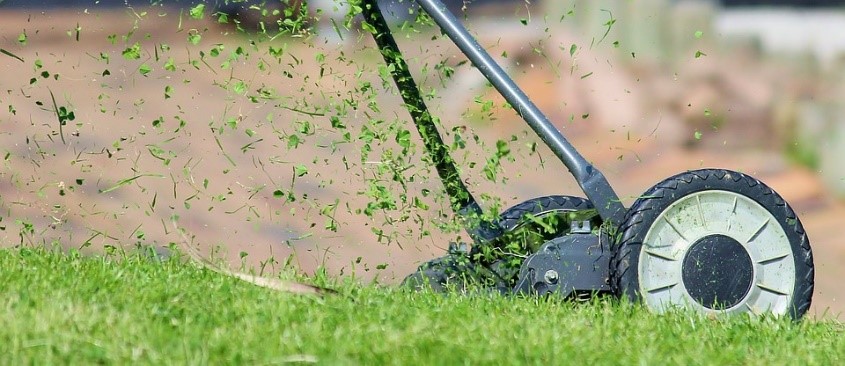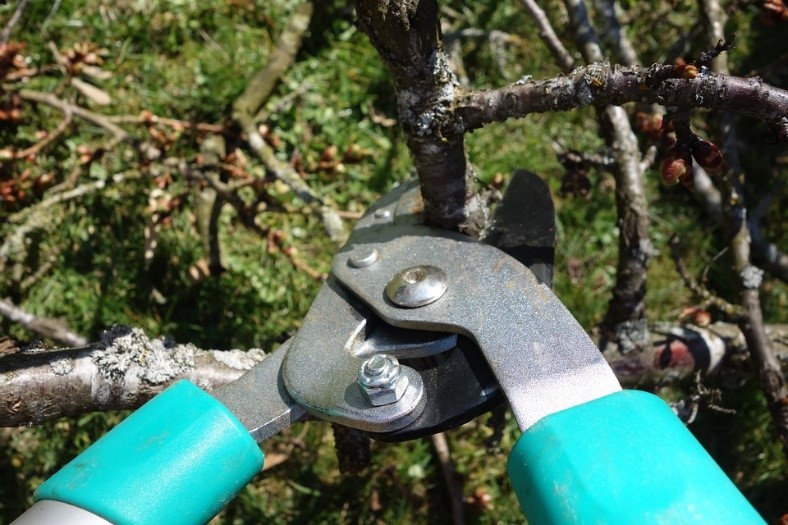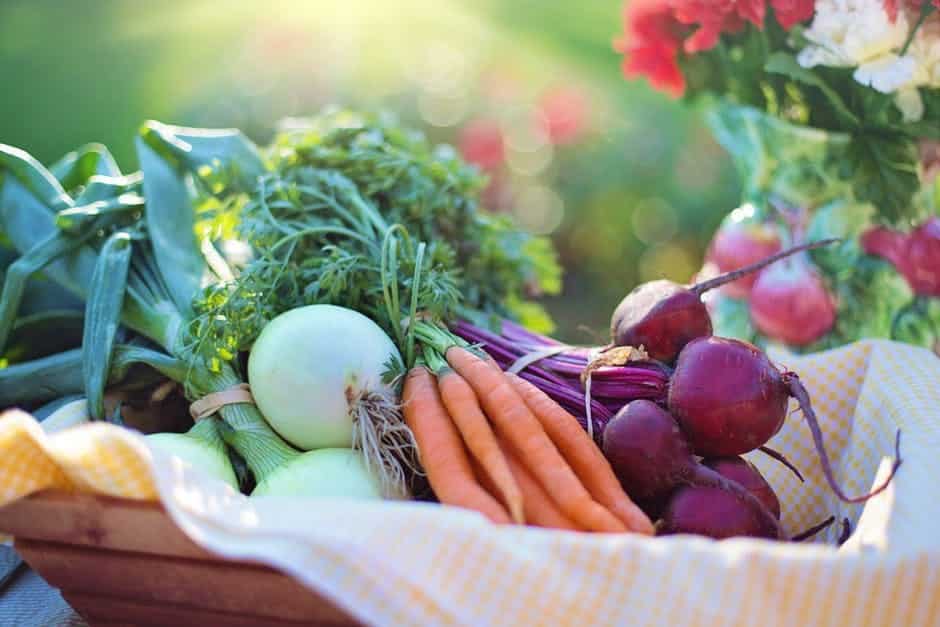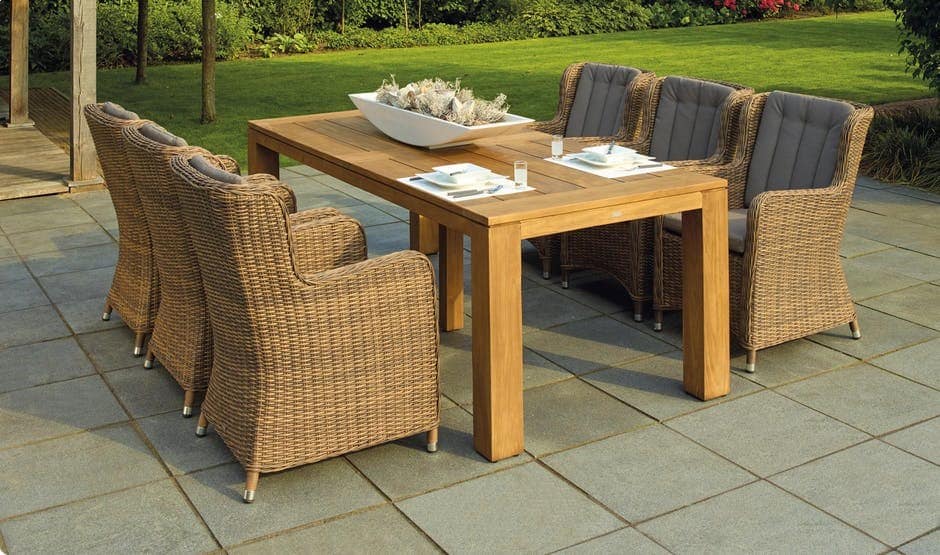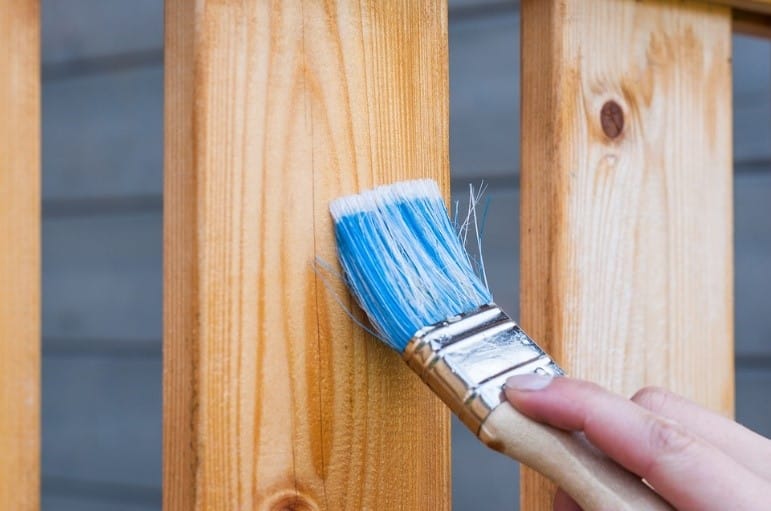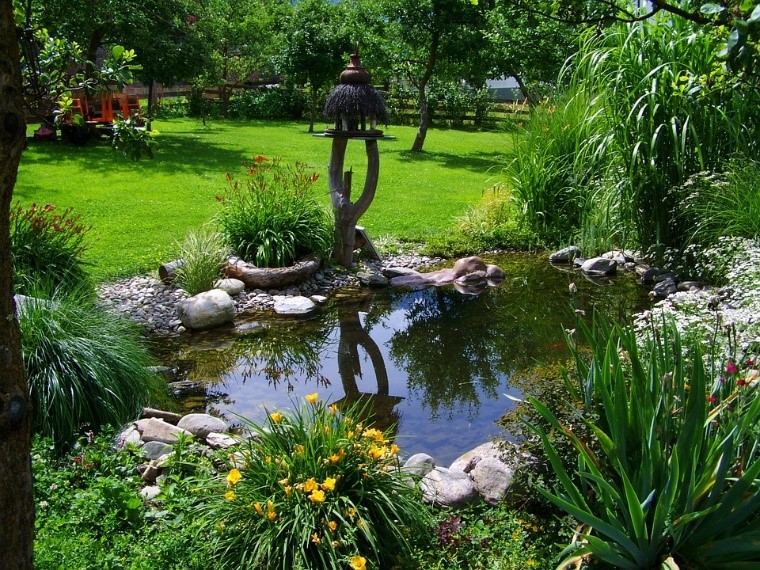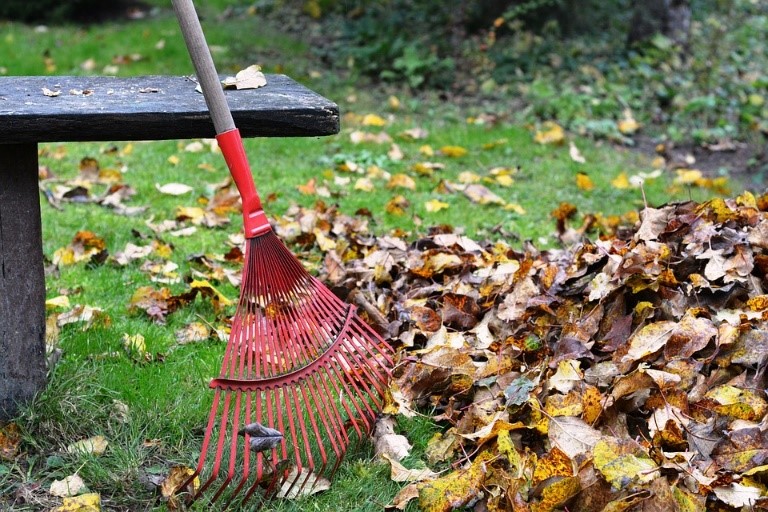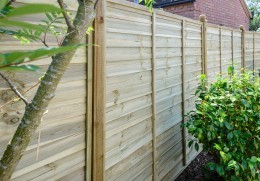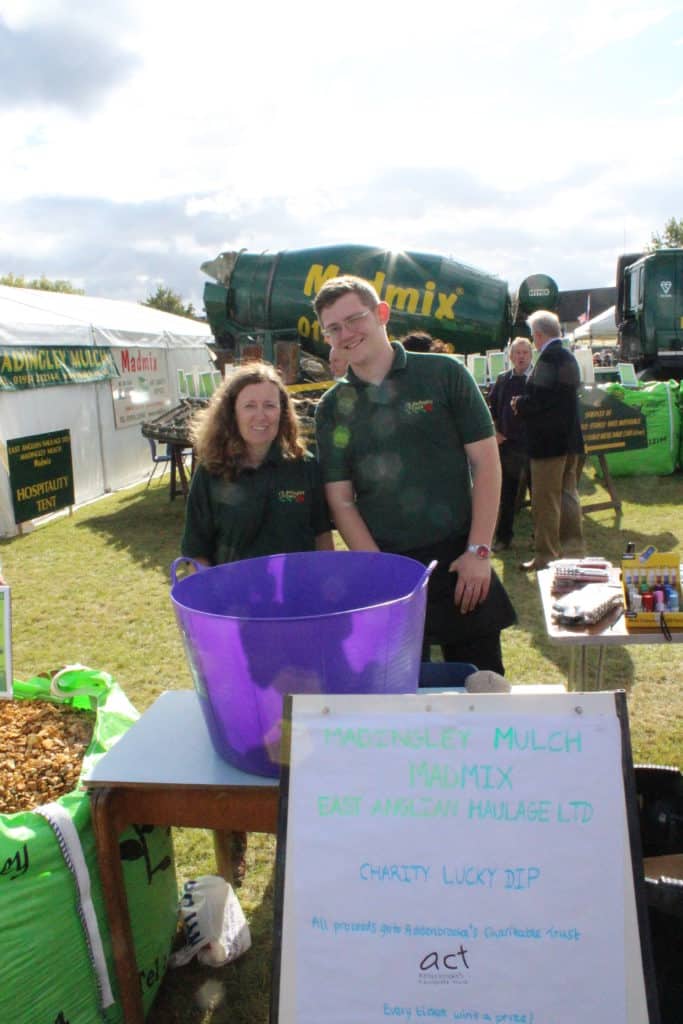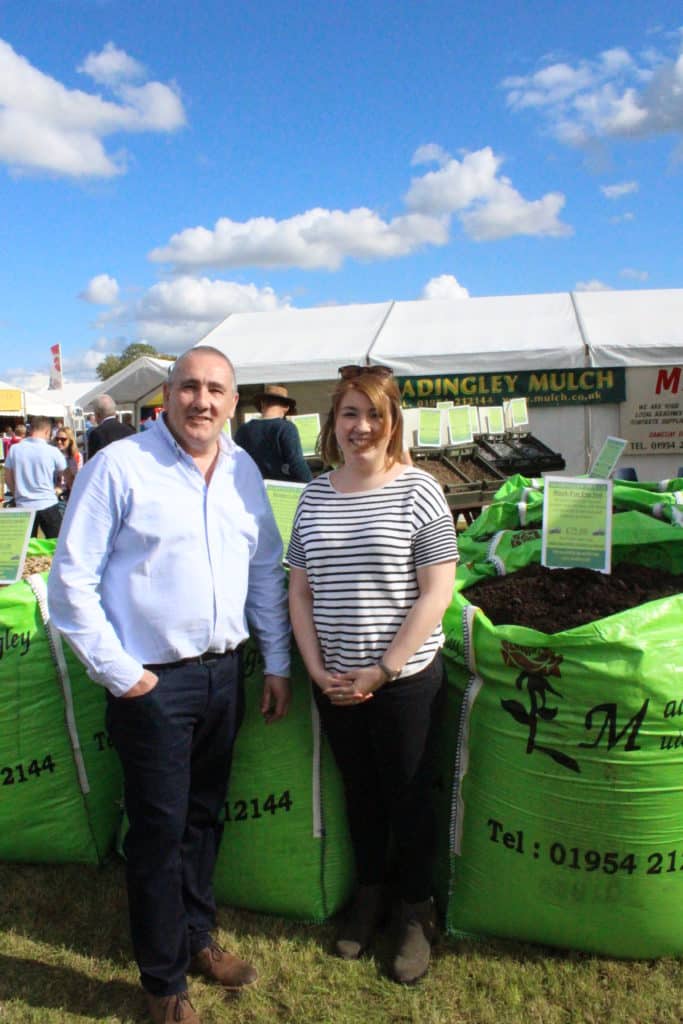How to Make Your Driveway Greener
Having a green driveway is not only good for your garden, but for the environment as well; studies have suggested that hard paving over drives has caused as much as £3billion worth of flood damage in the UK per year, as the rainwater cannot soak away naturally.
Madingley Mulch, who offer gravel delivery to customers in East Anglia, including Hertfordshire, Essex and Suffolk as well as our home county of Cambridgeshire, have come up with these key ways of making your driveway a vibrant and integral part of the rest of your garden.
Add Some Raised Beds
To create a greener driveway, you can add raised beds along either side of the drive or on the driveway itself (down the middle section that isn’t driven over). Alpines and herbaceous perennials should do well in these, provided they get enough rainfall.
To make the driveway area truly sustainable, try growing vegetables in the raised beds. Root vegetables, leafy greens, tomatoes and onions will all benefit from soil which can be tailored to the needs of your individual vegetables. While you probably won’t be able to survive solely off these vegetables, if you put the work in, it will definitely help to supplement your weekly food shop.
Growing in Gravel
Another alternative to raised beds is to fill in the drive – apart from the paved tracks – with gravel as a huge number of attractive plants will grow happily in this. Forget-me-nots and Californian poppies will both self-sow prolifically, which is important in driveways with a high footfall. If you are worried about unwanted plants growing through, then you can lay down one of our weed-suppressing membranes.
Creeping thyme can cope with being stepped on occasionally and also has a very pleasant scent and colourful pink flowers. Sedum is also a great choice for driveways because it will flourish in poorer-quality earth.
Make Full Use of Fences and Potted Plants
Fences and trellises alongside driveways can often be used for climbing plants – although make sure you have enough room to open the car doors when you want to get out, to avoid damage to both vehicle and plant.
Wisteria and clematis are best to grow up fences and walls rather than ivy or holly, which is highly invasive and will grow just about everywhere, including on other large host plants, trees and other places you don’t want it to.
You can also make good use of potted plants, again making sure you put them well clear of where your car or vehicle will go. If your driveway is in the front garden, then you could use it to bring vibrant colours for every season; one possible colour scheme could be violas for winter, tulips in spring, alliums in summer and agapanthus for the autumn.
Stones and Gravels
We supply a wide range of decorative stones and gravels. Our 20mm white gravel is our most popular and is frequently used on driveways, but the 20mm gold gravel is also in high demand.
As well as gravel and stone chippings, we stock a huge range of pebbles and cobbles in various sizes, colours and textures, including our popular Lydd Beach and Scottish pebbles, which are ideal for edging paths and borders.
For a clean, inviting appearance on your driveway, we recommend slate chippings. These are graded in such a way that they will never get stuck in the grip of your tyres, find its way into your house or need regular sweeping and maintenance. The range of slate chippings come in various colours including blue, green and plum, which means it can be well-matched to any colour scheme you opt for.
Slate chippings are also well suited to decorating gardens with other hard landscaping features, such as decking and paving. The chippings act as a form of mulch, suppressing the weeds and their size means they aren’t likely to be dug up by cats.
Madingley Mulch supplies a range of outdoor gardening products, including gravel, decorative stones, cobbles and weed-suppressing membranes. Follow the link above to view our current range, or pop in to see us at our base on the edge of Cambridge and our friendly, experienced staff will be happy to offer their advice.
We can offer free gravel delivery to parts of Hertfordshire, Suffolk and Essex; there is no charge on orders for any of our products to all addresses within 15 miles of our base on the edge of Cambridge. For all addresses within 24.5 miles, there is a standard £20 charge, and we can also deliver further afield as well.
Maximising the Space in a Small Garden
Gardens are getting smaller – and that’s official. Figures show that pressure on space, particularly in towns and cities, means that the average British garden has shrunk by as much as 5m² in the past 30 years.
However, there are plenty of tricks of the trade which you can use to disguise the lack of room in your garden – and leading gardening supplies company Madingley Mulch, who deliver to customers in Suffolk, Cambridgeshire, Essex and Hertfordshire, are ideally placed to pass them on. Here are our top five tips for maximising your space if you have a small garden.
Mirror, Mirror, on the Wall (or Fence)
You can use strategically-placed mirrors to create the illusion of extra space and make your garden seem bigger than it really is. The mirror doesn’t have to be on a wall; it can be on a fence or freestanding. A mirror can make a footpath appear twice as long, or a flower bed twice as lush. Just make sure you position it correctly – you don’t want two different views of the same rubbish tip or dustbin!
Keep Everything Tidy
Make sure you keep on top of the weeds because unwanted plants and overgrown flowerbeds will simply make the garden look crowded, unkempt and messy. It’s also important to make sure you prune your plants regularly to maximise their growth and ensure they stay healthy.
If you want to suppress weeds, then mulches are an excellent idea; they effectively suffocate any unwanted plants at source, and help the soil retain moisture in summer and protect plant roots in winter. As leading garden mulch suppliers, we offer a range of premium mulches and soil conditioners, including our exclusive mixtures, Tony’s Tonic and Denise’s Delight – rich blends of Black Fen soil, well-rotted horse manure, wood shavings, humus and plant nutrients.
Create a Courtyard
A courtyard-type space or patio that’s not crammed full of plants will make sure you get maximum use out of your garden. Hard landscaping like this with no lawns or large flowerbeds does away with lawn mowing and lowers the amount of maintenance work you need to do.
By highlighting and accentuating your garden’s best features with the right type of lighting, you’ll enjoy your garden as much at night time as you do during the day. When combined with comfortable garden furniture, warm, inviting lighting can provide the perfect ambience for evening al fresco dining, as well as providing security and safety.
We offer a range of different paving materials, including slabs and cement. Our Indian Sandstone and Premier Riven paving slabs come in a range of colours and textures to allow you to give your artistic side full rein as you can mix and match them to provide some interesting effects. We are also more than happy to advise on all paving enquiries.
Think Upwards
It may seem extravagant, but split-level decking or layered stepping stones can give you more space in your garden if you don’t have much room at ground level. These levels will offer somewhere to sit and relax or add potted plants to.
You could also consider trailing plants, such as wisteria or clematis, which could be attached to a trellis, or grown up a fence or wall, or the side of the garden shed. You can also buy specially-shaped pots or pouches which can be nailed to fences and walls too.
Small is Beautiful
There are many different types of plants you can grow to make your garden look attractive, however much you are constrained for space. Evergreens such as box plants will give you colour all year round and can also be cut or trained into interesting shapes. If you’re willing to put in a little extra work, you can plant seasonally and enjoy different, vibrant colour schemes from season to season.
Don’t get something which will grow too big and dominate all the other plants in the garden or deprive them of sunlight and moisture. If you want to go large, try potted plants which will not compete with anything else. It’s also worth experimenting with plants which will grow to different heights.
Striking varieties of lavender will perform well throughout the year and won’t take up too much space; while winter-flowering bulbs like crocus and tulip will provide an additional point of interest in the colder months, and the brighter the better.
Madingley Mulch delivers top-quality garden supplies, including bulk bags of compost, soil conditioners, garden mulch and paving slabs, to customers in Suffolk, Cambridgeshire, Essex and Hertfordshire. Click here to view our full range of products.
We can deliver in a range of ways, including bulk bags, small bags, pallet delivery, loose loads or weighbridge collections. We also offer a weekly delivery service to many towns and villages in the region, including Saffron Walden, Newmarket, Ely, Huntingdon and Royston. Please see our delivery page for more details.
The Benefits of Allotment Gardening
Cultivating an allotment can be one of the most rewarding and healthy pastimes one can pursue. Francis Bacon once said of growing a vegetable garden: “Indeed it is the purest of human pleasures. It is the greatest refreshment to the spirits of man.”
There are so many benefits to having a space to grow your own fresh produce – a peaceful little haven that revitalises your senses. Madingley Mulch offers fast compost delivery to addresses in Suffolk, Cambridgeshire, Essex and Hertfordshire, so you can grow your favourite fruit, vegetables and herbs yourself. Here we look at six benefits of tending an allotment.
Peace and a Sense of Accomplishment
Allotment gardening is a great way to relax and get away from the stresses and strains of everyday life. Not only can you enjoy the visual beauty of your allotment, but you can reap the many delicious and healthy rewards that grow above and below the soil.
Producing fresh fruit and vegetables on an allotment is a fantastic way to become more self-sufficient, save money and reduce your carbon footprint. It is also a great way to teach children first-hand where their fresh food comes from and how to grow it for themselves in the future.
Community Experience
Using an allotment can be a rewarding community experience. You are likely to make friends with like-minded people with similar interests and share knowledge and expertise with one another. Allotments are wonderful spaces of discovery for people of all ages, as more and more families participate in the ‘grow your own’ trend.
Health Improvements
Tending an allotment can be an excellent form of exercise for people of all ages and abilities. Spending just 30 minutes gardening on your allotment can burn around 150 calories – the same as doing a low-intensity workout at the gym.
If you’re fair-skinned, spending as little as 15 minutes in the sunshine can increase your body’s level of vitamin D. For those with darker skin, up to 90 minutes of sun exposure will help raise your vitamin D levels. Being outside and working your allotment can help your body to ward off some illnesses. However, it is also important to consider the long-term health risks of spending time exposed to the sun, so please make sure you stay protected.
Financial Gains
When managed properly over the year, an allotment can produce enough fruit and vegetables to supplement a family’s weekly shop. This does require hard work and dedication, but even the smallest amount of produce grown is money saved from the supermarket.
Most people don’t use chemical pesticides on an allotment, so you’ll be able enjoy fresh organic fruit and vegetables without the ‘organic’ supermarket price tag. Also. if you have invested the time and energy to grow your produce, you’re less likely to let it go to waste.
Environmental Impact
By using an allotment to grow fresh produce, you will reduce your carbon footprint, which is often linked with driving to the supermarket. Similarly, when you buy less packaged food from supermarkets, you are creating less plastic and household waste.
You’ll be amazed by what you see while working at your allotment: just one square metre of land can support hundreds of species of insects, frogs, spiders, hedgehogs, and many other kinds of wildlife. Allotments provide local wildlife with sustainable habitats, and these include birds, foxes, badgers, bees, butterflies, slow-worms and many others.
Using Mulch on Your Allotment
When your allotment is established, you should take the time to add mulch around the base of your plants, avoiding the stems. Mulch is perfect for suppressing weeds and protecting the soil from the elements. In the summer, mulch helps to retain moisture in the soil and in the winter, it retains warmth for the roots of your plants. Madingley Mulch have a range of high-quality mulches and top soils, including our exclusive product Denise’s Delight, a mixture of Black Fen soil, horse manure, wood shavings and other plant nutrients.
Consider the soil and climate conditions of your allotment and experiment with trial and error. Some of the easiest and most rewarding crops to grow on allotments are peas, lettuce and other salad leaves, onions, cucumbers, tomatoes, garlic, potatoes, rhubarb and strawberries.
How Madingley Mulch Can Help
As experienced compost suppliers in Suffolk and Essex,
Madingley Mulch provides a regular mulch and compost delivery service to Suffolk, Essex, Cambridgeshire, Hertfordshire and Bedfordshire. Orders within 15 miles of our HQ on the edge of Cambridge are delivered free, while deliveries up to 24.5 miles away have a £20 charge. We can also help organise deliveries further afield.
Give us a call today on 01954 212144 to speak to one of our friendly team or use our contact form.
Great Patio Garden Ideas
Patios can be traced back to Roman times, when only the wealthiest families could afford them. Today, however, they are an essential feature in any usable and functional garden space and can be put to a variety of different uses.
As specialist suppliers of paving slabs to customers in Bedfordshire, Cambridgeshire, Suffolk and Essex, Madingley Mulch takes a keen interest in all aspects of garden design and provides the highest-quality materials. Here we look at the main styles and uses of patios today.
Dining Alfresco
One of the most popular uses for a patio is for outdoor dining during the summer months or when entertaining guests. A patio doesn’t have to be reserved for barbecues, but should also be used for more sophisticated meals, at any time of the day. If it’s warm enough, you should get out there and use it!
Make sure you have durable garden furniture on your patio that can cope with the range of elements the British weather provides. Lighter plastic tables and chairs have been known to end up several gardens away after a strong gale.
If you are going to be using your patio simply for relaxing, then you should consider some comfier outdoor furniture instead of, or as well as, outdoor tables and chairs. These could include large weather-resistant beanbags, plastic sofas and armchairs or a wicker lounge set.
An awning is also a good idea, whether it is fixed to your property and extends over the patio or is freestanding. Awnings provide essential shade from the sun, as well as shelter if it begins to rain mid-barbecue.
If you are worried about a drop in temperature affecting your outdoor dining experience, particularly in the evening, you can use outdoor patio heaters, chimineas, fire pits and solar lighting.
Planting Out the Pots
Patios are an extension of your house and look great if you invest in a few plants to place around your patio. Reclaimed porcelain butler sinks, antique pots or old chimneys all look great with an attractive, colourful plant in.
You don’t need to be an avid gardener to keep a pot plant alive. There are hundreds of low-maintenance plants to choose from that require very little attention to stay looking great. With a little research, you can have flowers and plants blooming on your patio all year round.
Soaking up the Sun – or the Shade
What plants you get for your patio will depend on whether your patio is north- or south-facing. South-facing gardens will receive more sun, whereas north-facing gardens receive more shade.
If you’re going to be spending a lot of time in your garden or on your patio, for health reasons, it may be a good idea to limit the amount of direct sunlight you get. Trellises, pergolas, panels and awnings can all help to provide you with the correct amount of shade you require. Training climbing plants like honeysuckle, jasmine or bluebell creepers across a trellis will catch the sun they need to grow while providing shade to you at the same time. They can also increase your privacy from any other properties that may be overlooking your garden.
Courtyard Gardens
These are primarily patios that are used as full garden spaces but are enclosed on three sides, with the fourth leading back into the house. If there aren’t enclosed walls, then you can effectively add them with fencing panels, trellises and climbing shrubs and plants to create a sense of enclosure.
Don’t overfill a courtyard patio with plants, as it will appear too crowded and may look as if the plants are just being stored there. Be strategic in where you place your plants and make sure they always receive enough direct sunlight. If shade cannot be avoided, try growing evergreen plants, such as hostas, daphnes or aucuba.
Madingley Mulch – Helping You Create a Perfect Patio
Whether you already have one or not, Madingley Mulch provides everything you need to create a beautiful patio. We stock a huge range of different paving materials for different uses and applications.
Our textured paving or our Riven slabs are excellent all-round surfaces which work well if your patio is going to be an outdoor dining area as well as an area to relax in; Indian Sandstone slabs are relatively slip-resistant, so young children playing outside are unlikely to hurt themselves; our Old Grey courtyard paving and Rutland Oakham works best if you are creating a courtyard garden.
We can advise on the best materials for the best application, from creating patios, paths and paved steps in a variety of different styles and colours. We can also provide an entire range of gardening products to get your patio looking beautiful.
If you would like to know more about the types of paving slab Madingley Mulch offer, click here. Our friendly, experienced staff will be happy to advise you on which type of paving slab will be best for your garden.
If it is difficult for you to transport our paving slabs to your home, we offer a regular delivery service to towns and villages in the region, including St Ives, St Neots, Huntingdon, Cambourne and Saffron Walden. Orders are delivered free to all addresses under 15 miles of our base on the edge of Cambridge, while a standard £20 charge applies to all deliveries within 24.5 miles. We can also deliver to addresses further afield.
Spring Lawn Care Tips
Your lawn is one of the areas of the garden that should be a top priority over the spring months, as giving it a little care and attention now will pay dividends for the rest of the year.
Here are five top priorities for your garden’s grass this spring, courtesy of turf supplies specialists Madingley Mulch. We are based on the outskirts of Cambridge but supply a wide range of horticultural products to gardeners in Essex, Cambridgeshire, Suffolk, Hertfordshire and Bedfordshire.
Time to Mow
Spring is the time when you should be thinking about giving your grass its first mowing of the year. It is best to make sure you wait until a dry day, as a wet cut could do more harm than good. Cut the grass on the mower’s highest setting to avoid any risk of damaging the surface.
Trimming the edges will also ensure you have a lawn to be proud of in the summer months. Alternatively, garden lawn edging will cut down on maintenance and give it a clearly defined border. We can supply decorative kerb edging stones which are ideal for pathways and drives as well as garden borders.
Weeding and Scarifying
Clover, dandelions and buttercups and daisies all compete with grass for space to grow, and they usually survive close, regular mowing. Spring is a good time to get rid of these invasive plants. Smaller ones can be removed by hand, but you may need to use an appropriate weedkiller for the larger, more established varieties.
Moss is another of the gardener’s worst enemies, spoiling the look of the grass and inhibiting its growth. It thrives whenever the lawn is too wet or too dry, or because the underlying soil is too acidic. Applying a quality moss-killer, followed by some vigorous raking or scarifying, can both be done in the spring, provided there is a mix of sunshine and rain which will allow the lawn to recover.
Feeding Time
Spring is the best time of year to apply fertiliser to your lawn, as this will also stifle the growth of moss and weeds. It should be applied when the soil is moist, or when more rain is expected. You may need more than one application to improve any problem patches.
Reseed…
If your grass has suffered badly over winter, then consider reseeding bare patches or even returfing your lawn. If you opt to reseed, then you should break up the surface with a fork and rake it to provide a fine surface. Sow the grass seed, then rake the earth again. Some gentle watering may be necessary if the weather is fine; and keep off the grass until it has established itself.
Top dressing can also improve the condition of the turf, especially if there are dry patches showing. At Madingley Mulch our friendly, knowledgeable staff will be able to advise you about which lawn dressing is best for your grass.
…or Returf?
If you decide to returf your lawn or any other area of the garden, then good preparation will be key in helping your new grass establish itself. The area should be weed-free, but it is a good idea to avoid using weedkillers as they could harm the future growth of the grass.
As with reseeding, the lawn will have a better chance of flourishing if people avoid walking on it and, depending on the weather, will probably need daily watering. Regular applications of fertiliser about a month after the turf has been laid should give you a lovely green surface.
At Madingley Mulch we can supply good-quality, locally-grown turf and lawn top dressing supplies for collection and delivery in Cambridgeshire, Essex, and other East Anglian counties.
Our weekday delivery service is available on all orders to towns and villages throughout the region, including Haverhill, Saffron Walden, Cambourne and Newmarket. Delivery is free to all addresses within 15 miles of our base on the outskirts of Cambridge, while a standard £20 charge applies to all places within 24.5 miles. Orders can be delivered to addresses further away as well.
Spring Jobs in Your Garden
Spring is one of the most important times of the year for the gardener, as carrying out a few simple tasks now can not only save you a lot of time later on but also make sure your garden looks good, particularly during the summer months.
Madingley Mulch, who are based on the outskirts of Cambridge, stock a comprehensive range of outdoor gardening supplies to help keep your plants in pristine condition. Here are our five key spring jobs which you should consider making a priority.
Controlling Weeds and Slugs
Weeds get a head start on other, more desirable plants as they can flourish in lower temperatures. Annual varieties which need to be kept under control in the spring include nettles and thistles. These can be removed by hand or by hoeing. Laying down a soil improver such as an organic bark or wood chip mulch will also help smother the weeds.
Madingley Mulch supplies a wide range of mulches, composts and soil improvers for gardens in Essex, Cambridgeshire, Suffolk, Hertfordshire and Bedfordshire so we will be able to find the right one for your garden.
Slugs are another unwanted spring visitor, and they can cause a lot of damage to your plants. Gardeners should encourage toads and frogs, by installing a pond or large water container, as they will eat the pests. You can also position jars of beer or soapy water close to vulnerable plants to trap and drown the slugs.
A Good Time to Prune
Many shrubs like lavender, buddleias and fuchsias, require pruning at this time of year. Removing any diseased or dying stems will help promote fresh growth later in the summer.
Rose bushes should also be pruned during spring. Make sure your secateurs are sharp, and make any cuts no more than 5mm above a bud and sloping away from it. This will ensure that any rainwater does not collect on the bud. This applies to all cuts, whether removing dead wood, deadheading or annual pruning
Plant Bulbs for Summer Colour
Tender summer-flowering bulbs should be planted in the spring months. Gladioli, begonias and dahlias are the most reliable varieties and will give you plenty of colour once summer comes. They can initially be planted in pots, and then transferred into beds later once they have become established.
Many summer bulbs, like alliums and agapanthus, prefer a sunny spot with free-draining soil. If the earth is too moist, then the roots can rot. Other varieties, such as lilies and begonias, prefer their soil rich and damp.
Trees and Shrubs
Spring is a good time to plant trees and conifers, as, when the soil begins to warm up, the roots will soon start to grow. Deciduous varieties can be planted up until the end of March, while evergreen species can be grown from April onwards. Keep them widely spaced so they do not compete with other plants.
Mulch Beds and Borders
Whether you are planting or weeding, putting down a layer of mulch is a vital component in improving the look of your garden. As well as suppressing weeds and other pests, spreading mulch in borders and beds in early spring will also help retain moisture, which will ensure the plants do not dry out too quickly in the heat of the summer.
In East Anglia, mulches are particularly useful as they can help improve the quality of the heavy clay soil which is common throughout the region. At Madingley Mulch we can supply a wide selection of mulches and other soil improvers for gardens across Essex, Cambridgeshire, Suffolk, Hertfordshire and Bedfordshire.
Denise’s Delight is a product, which is exclusive to Madingley Mulch and contains Black Fen soil, well-rotted horse manure, wood shavings and plant nutrients. It is particularly suitable for raised beds.
We offer a regular weekday delivery service to towns and villages across the region, including St Ives, St Neots and Royston. Orders are delivered free to all addresses under 15 miles of our base on the edge of Cambridge, and a standard £20 charge applies to all deliveries within 24.5 miles. Deliveries to addresses further afield can also be arranged.
A Beginner’s Guide to Growing Vegetables
One of the most satisfying experiences for any gardener is being able to grow and eat your own vegetables. This can give you a real sense of achievement and also cuts the size of your grocery bill.
If you are growing your own for the first time, Madingley Mulch has compiled this guide to help fill your dinner plates with your own fresh, tasty produce. We are suppliers of bark much, soil conditioners and other products which will help you to grow great vegetables, all ideal to enhance the soil types in Suffolk, Cambridgeshire, Essex and Hertfordshire.
The Best Location
Most vegetables prefer a bed with plenty of sun, so try to pick an area of your garden which is south-facing. However, you will still get decent crops of some types of vegetables, such as lettuce and spinach, in shady areas.
You should also steer clear of areas which are exposed to the wind; cucumbers and tomatoes in particular like plenty of protection. If planting in a more exposed area is unavoidable, consider putting in fencing panels or wind breaks. It is also a good idea to plant your vegetables well away from any large trees and hedges, as these can deprive them of valuable moisture as well as sunlight.
Preparing the Ground
If you are digging out a patch for the first time, spend plenty of time clearing out the weeds. Japanese knotweed, ground elder and bindweed are among the likeliest types to appear in UK gardens.
Where your new area is going to replace a patch of grass, then dig out the turf and stack it upside down; this way it will eventually compost into topsoil, which can then be recycled a few months later.
Adding manure, mulch or compost to the earth in any vegetable plot is a good idea; it gives more substance to light soils, while heavier earth with plenty of clay drains much better. If you are looking to enrich your soil, try Denise’s Delight, our exclusive product which contains Black Fen soil, horse manure, wood shavings and plant nutrients, giving it all the advantages of both soil and compost.
The Best Vegetables to Try
Salad leaves like lettuce, rocket and spinach are easy to grow and bring quick results. They are best sown in stages, so you don’t end up with more than you can eat. Radishes are also straightforward to grow and can be cultivated in pots as well as in the ground.
If you want to grow vegetables which require very little maintenance, then consider planting onion sets. These are baby onions which need only a little watering in dry spells. Rhubarb also needs very little ongoing care and attention and hardy varieties can be planted in the autumn and winter months. Broad and runner beans are also easy to cultivate, but you will need to create a frame of wire or bamboo canes for them to grow up.
Keeping Weeds at Bay
It is a good idea to lay sheets of clear plastic on the ground for a couple of weeks in late spring. This encourages any weed seeds in the earth to germinate. Once you remove the sheet, they can easily be removed by hand. It also warms the soil, meaning you can plant any seeds earlier in the year.
A carpet of mulch will also help to suppress weed growth. At Madingley Mulch we are expert bark mulch suppliers, and we supply other mulches such as rustic mulch, pathway chips and decorative mulch, to help keep weeds down and improve the look of your garden at the same time. Other products to prevent weeds taking hold include Groundtex weed suppressing membranes and Roundup weedkiller,
Madingley Mulch can also supply a comprehensive selection of other gardening products, including decorative stones, turf, paving slabs and fencing panels to gardeners in Suffolk, Cambridgeshire, Essex and Hertfordshire. Click here to browse our product range.
All orders can be delivered free to addresses within 15 miles of our base on the outskirts of Cambridge, and there is a standard £20 charge to all addresses within 24.5 miles. Towns and villages which we offer a regular delivery service to include Comberton, Coton, Hardwick, Ely, Newmarket and Cambridge.
Spotting the Hottest Gardening Trends in 2018
This year promises to bring some exciting new horticultural trends which are suitable for all types of gardens. At Cambridge outdoor gardening supplies company Madingley Mulch we keep abreast of all the latest developments in gardens and garden design. Here are our predictions for what will be popular in the coming months.
Growing Your Own Fruit and Veg
Buying vegetables from your local supermarket or greengrocer is unlikely to get any cheaper during the year. This, coupled with the growing popularity of veganism and vegetarianism, means that more people are likely to devote at least part of their garden to a vegetable plot.
The addition of a greenhouse will give you fresh fruit and veg all the year round. In smaller-sized gardens, French, broad and runner beans all make very efficient use of space as they grow vertically. Using soil conditioners, such as spent mushroom compost and our own special products Denise’s Delight and Tony’s Tonic, or mulches will enrich the soil and ensure you get a good crop of vegetables. Herbs, tomatoes and salad leaves can all flourish in window boxes and on patios.
Adding a Touch of Colour
Gardens are a blank canvas, waiting to be filled, and in 2018 many colourful varieties of hibiscus and petunia are predicted to have a good year, following on from their success at various trade and horticultural shows. Strategically placed potted plants can also give added zest to a patio and other areas of the garden.
However, many gardeners will be going for a more natural look, by planting plenty of lush greenery. Low-level ferns and tufted grasses work particularly well if your garden has plenty of shade. Another way of achieving this is to letting moss grow over stones and allowing existing plants such as perennials to go unpruned. You can also brighten up your garden by choosing coloured gravels, such as plum or purple slate chippings, or decorative garden stones, for your paths and edgings.
Going Alfresco…
The idea of creating an ‘outdoor living room’ in your garden looks set to continue in 2018. This can mean laying down a new patio, or improving an existing one by adding attractive patio paving slabs. Having two garden benches facing one another will let you create an intimate area, and you can add further touches like tables, subtle lighting, and fire pits. You will then be able to wine and dine with your family and friends in the comfort and seclusion of your own garden.
At Madingley Mulch we supply a range of patio paving slabs to create your perfect outdoor space. These include Premier Riven and Indian Sandstone slabs, which come in a choice of colours for a superior decorative finish, while our Rutland Oakham gives you a more natural look.
…and Moving Indoors
The process can also work in reverse, with the garden being brought into your home. Houseplants like chrysanthemums and hydrangeas are likely to be popular in brightening up an interior, while species like aloe vera will improve the air quality by absorbing some of the atmosphere’s harmful chemicals.
Madingley Mulch, (https://www.mulch.co.uk/products-pricing/) supply a wide range of outdoor gardening products to customers in Cambridgeshire, Suffolk, Essex, Hertfordshire and Bedfordshire. Our staff can provide plenty of helpful advice if you want to keep up with all the latest trends. Follow the link above to see our current range.
We offer a regular delivery service to towns and villages in the region, including St Ives, St Neots, Huntingdon, Cambourne and Saffron Walden. Orders are delivered free to all addresses which are under 15 miles of our base on the edge of Cambridge, while a standard £20 charge applies to all deliveries within 24.5 miles. We can also deliver to addresses further afield.
Getting Your Garden Ready for Spring
It may not be the prime growing season, but there are still plenty of jobs you can do in and around the garden now which will ensure it is in pristine condition come spring and summer.
As an experienced garden supplies company, based in Cambridge and supplying customers in Hertfordshire, Essex and Suffolk, Madingley Mulch has compiled these top tips on getting your garden ready for spring..
Keep It Clean
Keeping on top of all the messy jobs will save you time when you do start planting. Now is a good time to clean out your greenhouse and garden shed. Wash the floor and benches, clean out any seed trays, and get rid of any plant debris on the floor. Pests can also get into all sorts of nooks and crannies in greenhouse glass so this should be disinfected as well.
Poorly-maintained tools can also spread disease. Cleaning and sharpening bladed tools such as secateurs now will save you time when you need to do some serious pruning, while applying oil will help keep any rust at bay.
Beware of Weeds
Perennial weeds can still grow over the winter months. Forking these out by hand or removing them with a hoe will keep them under control. Laying down a quality mulch will help to combat weeds, while another option for some areas, particularly under gravels, is to use a weed suppressing membrane. We stock Groundtex, a heavy-duty membrane which is also resistant to any animal activity.
Prepare Your Soil
Before planting your spring plants and crops, it is a good idea to enrich the soil. Madingley Mulch’s exclusive product Denise’s Delight is a mixture of Black Fen soil, horse manure, wood shavings and humus which will add nutrients to your garden soil. We also stock other
Prune Larger Plants
You can start pruning apple and pear trees early in the New Year to encourage better growth in the spring. If the weather is good enough, you can move some plants such as deciduous shrubs to a better spot, preserving as much of the original root as possible.
Start Sowing Seeds
Some flowers and vegetables have a longer growing season so now is an ideal time to plant them. Geraniums, begonias, peppers and aubergines can all be started in heated propagators to ensure good growth. Fruit bushes such as redcurrants and blackcurrants can also be planted in February. You can also do some forward planning, working out where you are going to put plants and vegetables in the year ahead, and buying any packets of seeds.
Keep Everything Secure
The weather can be quite severe over the winter months, so it is worthwhile spending some time making sure your garden is as secure as possible. Make sure any fence panels are in good condition, and, if you have a dry day, give them a fresh coat of paint or preservative.
Consider covering any vulnerable plants with netting or mesh to protect them from the worst of the weather as well as from hungry birds and pests.
Madingley Mulch supplies a range of garden products, including mulches, turf, fencing panels and soil conditioners, to customers in Hertfordshire, Cambridgeshire, Essex, Suffolk and Bedfordshire. Click on the link above to see our range.
We offer free delivery on all orders to addresses within 15 miles of our base on the edge of Cambridge, and there is a standard £20 charge for all orders within 24.5 miles. Towns and villages we provide a regular delivery service to include St Neots, St Ives, Swavesey and Cambourne.
New Year Resolutions for the Keen Gardener
The New Year is a time for making resolutions, and gardeners are no exception. As soil improver specialists, Madingley Mulch are experts in helping horticulturalists plan ahead and get more out of their garden. Here we suggest five of the top priorities for the coming year for gardeners in Hertfordshire, Essex, Suffolk and Cambridgeshire.
Try Out Some New Plants (and Vegetables)
Although you may not see the full benefit immediately, planting some different small trees and shrubs can add splashes of colour to your garden, provide you with some tasty fruit and support wildlife. Whatever you decide, try to make it a species which is native to this country, as it will have a better chance of flourishing.
Growing some new vegetables, or creating a patch from scratch, will give you some delicious home-grown produce to try, and reduce the size of your grocery bill.
Remember the Wildlife
Installing bird feeders and nesting boxes will add extra points of interest to your garden, particularly for children. For gardens where space is at a premium, roof terraces and window boxes can be used to attract bees and butterflies, which will also help with pollination.
If you have room, you could consider installing a pond; not only can you put fish in it, but you will also attract other forms of wildlife, including dragonflies and water beetles. They are also ideal for birds to bathe in. Make sure at least one side of the pond has a gentle slope, so creatures can get in and out easily.
Feed Your Plants Organically
Another resolution gardeners should make is to use organic matter rather than liquid feed to nourish plants. Compost and mulch is better for the whole soil, rather than just individual plants.
Madingley Mulch supplies a range of soil improvers and conditioners, composts and mulches, including Denise’s Delight. This exclusive mulch mixture contains Black Fen soil, plant nutrients, horse manure and wood shavings, which is great for growing strong and healthy plants.
Be Creative with your Space
Don’t be afraid to think laterally to give your plants a better chance of surviving. You could create some raised beds, and use plenty of containers and pots. This will spread out your plants and give them a better chance of surviving and flourishing. It will also give protection, reducing the chances of them being trampled down or damaged, and mean you can water them much more accurately and effectively.
Enjoy It
If you set aside time every week for chores such as weeding, then that will help keep your garden looking trim and tidy and you won’t have to spend large amounts of time keeping it under control. Remember your garden is something that should be enjoyed as well as worked in.
Madingley Mulch supply a range of mulches, composts and other soil improvers, to gardeners in Hertfordshire, Suffolk, Essex, Bedfordshire and Cambridgeshire. Our garden, DIY and building materials shop also has a range of helpful horticultural accessories. Follow the link above to see our range of stock.
We offer regular deliveries to towns and villages including Royston, Ely, Huntingdon and Saffron Walden. All orders can be delivered free to addresses within 15 miles of our base on the edge of Cambridge, and a standard £20 charge applies to deliveries within 24.5 miles. We can also deliver to addresses further afield.
Adding Colour to Your Garden in Winter
With a little careful planning and planting, you can still have a garden which will brighten up the dullest of winter days.
At outdoor gardening supplies company Madingley Mulch, we provide a range of products and helpful advice all the year round from our Cambridge base for gardeners in Essex, Hertfordshire and Suffolk as well as Cambridgeshire. Here are our top tips for adding colour to your garden in winter.
Small is Beautiful and Colourful
Even though the peak growing season is over, some plants will still flower in the colder months of the year. Winter aconites will produce a vivid yellow flower and do particularly well in wilder, more natural gardens.
Several winter-flowering varieties of heather will also flourish, while winter pansies can flower right through autumn, winter and into spring. You may be better off planting these in hanging baskets or pots and you should make sure that you get rid of any dead flowers.
Larger Plants and Shrubs Can Thrive Too
Herbs like rosemary, lavender and thyme will add colour to your garden and will also help you add some flavour to your cooking.
Conifers can also add plenty of colour to your garden, and if space is limited then consider planting slow-growing varieties. Another plant to consider growing is the clematis, as some types can flower from November right through to March.
Stones and Slabs Can Add Colour
Putting down new gravel or stone pathways or even laying down a new patio can add colour and definition to your garden. We can supply various types of paving stone from our base in Cambridge, such as our Premier Riven slabs which come in four different colours which can form an attractive pattern on any patio.
We can also supply a range of decorative stones, such as our 20mm red granite chippings or Staffordshire pink pebbles, for an additional splash of colour. These will also help act as a mulch to your borders and help your garden drain more easily.
Another hard landscaping method you can use to brighten up your garden in winter is to give any fences a fresh lick of paint.
Celebrating Christmas
You can give nature a helping hand to look even more colourful, particularly over the festive period. Christmas lights can be added to trees and shrubs in your garden as well as being used indoors. Planting additional holly bushes will underline the approach of Christmas and add extra splashes of green and red to your garden.
All orders from outdoor gardening supplies specialists Madingley Mulch can be delivered free to all addresses within 15 miles of our base on the outskirts of Cambridge, and a standard £20 delivery charge applies to all orders within 24.5 miles. Our delivery service operates in towns and villages across the region, including St Ives, St Neots, Longstanton and Saffron Walden. We can also organise deliveries further afield.
Follow the link above to find out more about our current range of stock. Our friendly, knowledgeable staff will be able to plenty of helpful advice on how to add some colour to your garden in winter.
Getting Your Garden Ready for a Cold Snap
Although the winter nights are closing in, there are still a number of jobs you can carry out to keep your garden looking good in the months ahead
At Madingley Mulch, as garden suppliers we know all about preparing for winter and here we have put together some top tips which are ideal for gardens in Essex, Cambridgeshire, Suffolk and across East Anglia.
Move Vulnerable Plants Indoors
Temperatures can rapidly plummet in the winter months and frost can kill many plants in your garden. Vulnerable plants like dahlias and begonias can be replanted in tubs and then stored in your greenhouse over the winter months. Giving them a fresh covering of mulch or compost will provide an additional layer of protection.
It is a good idea to give your greenhouse a good clean and get rid of any rubbish to maximise your storage space, and ensure that your heaters are in good working order. Your garage can also provide a temporary home for some of your plants.
Protect Plants Left Outside
If you are leaving potted plants outside, you can raise the containers off the ground using pot feet to make sure their soil does not get flooded with water. You can also cover pots with bubblewrap; even leaving the pots close together will reduce the risk of winter damage.
Netting and straw are also good sources of protection, particularly for shrubs like brassicas, which are often attacked by pigeons and other birds. You can also buy specially-designed fleeces, jackets and blankets for larger plants such as fruit trees.
Dispose of Debris
This time of year is ideal for clearing up leaves, not just off the lawn but from other parts of the garden such as ponds and beds.
You can clear leaves off the lawn by using a rake and you could also use a mower on a light or raised setting. This way it won’t damage cause permanent damage to the grass but will shred the leaves which can then be used for compost.
Prune and Weed
Smaller trees and shrubs should be cut back. Consider calling in a professional if the tree is particularly big. If you have time, get rid of as many unwanted weeds as possible and apply weedkiller where necessary.
If this all creates a lot of bulky rubbish that can’t be composted, then one effective way of getting rid of it is to burn it. Bonfires should be kept well under control and it is advisable to avoid upsetting the neighbours with any smoke.
Plant for the Winter and Spring
Annuals can be replaced with winter bedding plants such as pansies, violas, primroses and wallflowers. They will flower during the winter months during milder spells and put on a spurt of growth in the spring.
Other hardy plants will still flower over the winter months. Ornamental and winter flowering heathers should survive the harshest of winters. Bulbs which should be planted now include tulips, daffodils and snowdrops which will then flower early in the New Year.
To give any new plants the best chance of success, consider spreading some compost around your garden or laying down some mulch. This will improve the quality and drainage of the soil, which is particularly important if it is a wet winter. We can supply Denise’s Delight, our exclusive product which combines all the advantages of soil and compost. It contains Black Fen soil, horse manure, wood shavings and plant nutrients.
Madingley Mulch are suppliers of compost, soil conditioners and mulch to customers in Essex, Cambridgeshire, Suffolk, Bedfordshire and Hertfordshire.
We have a delivery service to towns and villages across the region, including Huntingdon, Haverhill, Ely and Newmarket. Delivery is free to all addresses within 15 miles of our base on the edge of Cambridge. A standard £20 delivery charge applies to all within a 24.5 mile radius, and we can also arrange deliveries to places further away. Follow the link above to find out more about our wide range of products.
Ways to Make Your Garden Secure
Now the clocks have gone back, many people’s thoughts turn towards garden security, as the additional hours of darkness can be tempting to burglars. An unprotected garden can lead to the loss of valuable plants and equipment and many thieves use it to gain access to your home.
If you are looking to improve your garden security, as fence suppliers based in Cambridge we can advise you on the best products to install and give you extra peace of mind over the winter months. Here are our five top tips for making sure your garden is secure.
Fences and Gates
Having a solid fence installed should deter unwanted visitors, particularly if it is high enough. Adding a trellis at the top will provide additional height and security, particularly if you let a prickly climbing plant grow through it. You should always make sure that your fencing panels are kept in a good state of repair, and replace them if necessary.
Garden gates fitted with locks can be an important deterrent. Fit two padlocks or catches where possible, and keep them locked whenever they are not in use.
At Madingley Mulch, we supply fence panels and posts, including picket panels, to customers in areas including Cambridge, Essex, Suffolk, Bedfordshire and Hertfordshire. Our heavy-duty trellises can be used on their own as well as on top of fences, and will support a wide range of climbing plants.
Plant a Hedge
Hedges look attractive in their own right as well as discouraging unwanted visitors. You can plant conifers side by side, and they should grow thickly enough to make it difficult for people to get through. Medium-sized hedges like hawthorn, holly and firethorn are particularly good for security because they are so prickly. Lower-growing thorny shrubs can be planted under drainpipes and at the base of fences to discourage people from climbing up them.
You can also use mulch to give your new hedge the best chance of flourishing, as it will help retain moisture in the soil. Don’t let it come into direct contact with the plant, as this could damage it. Madingley Mulch can exclusively supply Denise’s Delight, a mix of Black Fen soil, horse manure, wood shavings and plant nutrients, which gives the benefits of both soil and compost.
Lights Work
Light is a proven deterrent against thieves and burglars. However, you need to ensure that any additional light does not shine in areas which could annoy neighbours or distract road users. Solar-powered lamps are cheap, low-intensity and ideal for use in the garden. Timers and motion sensors can ensure your lighting only comes on when you need it to, as well as keeping the cost down.
For additional protection, you could consider installing alarms. There are a number of systems which work by detecting movement in the garden. Ideally any alarm should cover your sheds and outbuildings.
Lock It or Lose It
Garden furniture should be stored away whenever it is not in use. You should also make sure that your shed or garage is securely locked. It may also be worth having a separate padlocked box or safe inside the shed, for the more valuable items. Larger individual plants and statues can be cemented in place or secured with a form of anchor such as a bolt fixed to a wall or the ground. You can also mark items with a UV pen with your postcode.
Our store has a large ironmongery section which stocks a range of hinges and bolts, plus night latches and Yale locks. We can also supply heavy duty waterproof padlocks for garden sheds and garages.
Drives and Pathways
It can also be worth investing in a gravel path or driveway to improve security. A gravel surface looks good, and it is also noisy underfoot, so you get plenty of warning if someone is coming.
We can supply a range of decorative stone chippings, including 10mm blue stone, 20mm charcoal stone, and various forms of granite. All our range is low-maintenance and, as well as contributing to security, will also help improve your garden’s drainage and act as a deterrent to weeds.
At Madingley Mulch, we supply a wide range of garden security items from our base on the edge of Cambridge. Follow the link to find out more about our range of products.
We also offer a regular delivery service for orders for Newmarket, Huntingdon, Ely and Haverhill, and many villages, including Houghton, Swavesey and Cambourne. This service is free to addresses within 15 miles of our shop, and there is a fixed £20 charge for everywhere within a 24.5-mile radius. Deliveries can also be arranged further afield.
Does Your Garden Need an Overhaul?
Now is the ideal opportunity to have a rethink about your garden, particularly if it has become overgrown or untidy.
Madingley Mulch, based on the edge of Cambridge, are suppliers of turf and a wide range of products, including paving slabs, decorative stones and mulches, which will help give your garden a new look. Here we have identified some key factors to think about when giving it a complete overhaul.
Starting Afresh
You need to decide what you want to keep and to get rid of. Heavy pruning, which can be done over the autumn and winter months, may give some plants, shrubs and trees a new lease of life, but it may be better to get rid of others completely and start from scratch. Digging out new beds and covering them with mulch will give everything you plant the best chance of flourishing during the growing season.
Smaller gardens, where space is limited, could benefit from items being planted on different levels, whereas wildlife-friendly gardens encourage and require less maintenance. If you have room, a water feature will provide an added point of interest.
Replace Your Grass
If your existing grass is infested with weeds, or just looks old and tired, then laying down new turf, or planting new seeds, may be a better option for freshening up your garden in the spring months. You may also want to create a new lawn in an area which isn’t currently laid to grass, and again turf is the ideal way to do this quickly and effectively.
As quality turf suppliers, we supply a high-quality product grown locally in East Anglia. You can either collect it from our Cambridge base or we can deliver it to you. Alternatively, we can supply different types of grass seed. We can advise you on the ideal type of grass even if you are planting a lawn in an area which is shaded or is likely to come in for a lot of footfall.
Put in a Patio
You don’t need to replace grass with grass. A patio may be a better alternative or an addition, and it is also a great asset for your garden. It will offer an additional outside dining area for the warmer months, and mean you don’t have to worry about so much mowing and maintenance. You can also add planters and garden ornaments to enhance the effect, as well as garden lighting and heating so that you can use it for more of the year.
Madingley Mulch offer a wide range of patio slabs, depending on what type of effect you are looking for. For instance, our Old Grey Courtyard Paving creates a historic, weathered look, while our Premier Riven slabs have a more decorative feel.
Create Some Clear Boundaries
Putting up fencing panels, or low-level picket fences, will help create distinct areas, not just between you and your neighbour but also within your own garden. For instance, you can use a low-level picket fence to mark out a children’s play area, or create a themed miniature garden within a garden. If you already have fences, then as part of an overhaul you should repair or replace any rotting panels or posts, and treat them to protect them from the weather.
Pathways can also help add extra definition to your garden, and can also be comparatively low-maintenance. They can be covered with a range of decorative stones, pebbles and cobbles. We also offer pathway chips and a wood-based decorative mulch which is particularly suitable for recreation areas.
A Waste Collection Service
If you find your revamp has left you with a lot of weeds or garden debris you want to get rid of, our waste collection service in the Cambridge area is the answer. We will collect and dispose of the rubbish for you.
Madingley Mulch supply a wide variety of garden products to customers in Cambridgeshire, Hertfordshire, Bedfordshire, Essex and Suffolk. Follow the link above to find out more about our range of stock. If you are giving your whole garden a makeover, our friendly, professional staff will be happy to advise you on your requirements.
We deliver free to all addresses within 15 miles of our base on the outskirts of Cambridge, and there is a fixed £20 charge to all places within 24.5 miles. We can also arrange deliveries to locations further away. Our weekly delivery service goes to towns such as St Ives, Saffron Walden, Royston and St Neots, and villages including Hemingford Abbots, Great Stukeley and Longstanton.
Lucky Dip Aids Addenbrooke’s Charitable Trust
We had a lucky dip in aid of Addenbrooke’s Charitable Trust at the Gransden Show in Great Gransden, near Cambridge. This raised a superb £658, so many thanks to all those who had a go.
As some of you know, we have been raising money for this charity to thank Addenbrooke’s for saving the life of our CEO Steve Lunn’s daughter Hannah, who is now doing really well and was at the Show.
The lucky dip (pictured above) was on the Madingley Mulch and Madmix stand at the show, which featured displays of our landscaping supplies. Prizes included seeds, torches, vouchers, tape measures and many other items.
Hannah (pictured above with Steve) was diagnosed with a severe case of leukaemia in September last year and also suffered a stroke, but is now in remission, only needing bone marrow checks every 3 months. She enjoyed visiting the Show and supporting the fundraising.
The lucky dip has brought Steve’s fundraising total so far to more than £7,000 for the trust. A lot of the money was raised by sponsorship for painting his toenails claret and blue – the colours of the team he supports, West Ham. The aim is to raise a total of £28,200, and we are now more than 25% of the way there! Click here to find out more about Steve’s fundraising

